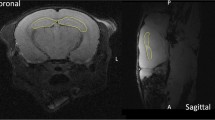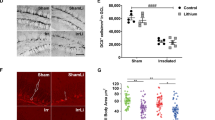Abstract
Fractionated cranial irradiation is an essential part of treatment in the management of cohorts of pediatric brain tumor and leukemia patients. Ionizing radiation damages normal brain parenchyma through a variety of poorly understood mechanisms and results in cognitive dysfunction and significant life-long disability. The goal of our study was to establish and characterize a mouse model of radiation-induced damage to the developing nervous system. Male C57BL/6 mice were exposed to a total dose of 20 Gy of fractionated cranial irradiation at 1 month of age to assess the early and late effects of clinically relevant irradiation doses on the young mouse brain. Compared to age-matched controls, an acute and prolonged decrease in proliferation and the number of immature neurons in the stem cell niche of the hippocampal subgranular zone within the dentate gyrus at 72 h and 1 month following cranial irradiation was noted. Behavioral characterization at 1 and 5 months post-radiation demonstrated significant, persistent and progressive hippocampus-dependent learning deficits. Our study characterizes a clinically relevant mouse model of radiation-induced damage that serves as a platform for future evaluation of therapeutic interventions that may mitigate such cognitive damage. Our research also emphasizes the need for targeted treatment strategies that protect regions of neurogenesis while maximizing therapeutic effects in pediatric cancer patients.



Similar content being viewed by others
References
CBTRUS (2011) CBTRUS statistical report: primary brain and central nervous system tumors diagnosed in the United States in 2004–2007. Source: Central Brain Tumor Registry of the United States, Hinsdale. www.cbtrus.org
Armstrong GT et al (2010) Region-specific radiotherapy and neuropsychological outcomes in adult survivors of childhood CNS malignancies. Neuro Oncol 12(11):1173–1186
Langer T et al (2002) CNS late-effects after ALL therapy in childhood. Part III: neuropsychological performance in long-term survivors of childhood ALL: impairments of concentration, attention, and memory. Med Pediatr Oncol 38(5):320–328
Ellenberg L et al (2009) Neurocognitive status in long-term survivors of childhood CNS malignancies: a report from the Childhood Cancer Survivor Study. Neuropsychology 23(6):705–717
Ellenberg L et al (1987) Factors affecting intellectual outcome in pediatric brain tumor patients. Neurosurgery 21(5):638–644
Jankovic M et al (1994) Association of 1800 cGy cranial irradiation with intellectual function in children with acute lymphoblastic leukaemia. ISPACC. International Study Group on Psychosocial Aspects of Childhood Cancer. Lancet 344(8917):224–227
Fouladi M et al (2005) Intellectual and functional outcome of children 3 years old or younger who have CNS malignancies. J Clin Oncol 23(28):7152–7160
Crossen JR et al (1994) Neurobehavioral sequelae of cranial irradiation in adults: a review of radiation-induced encephalopathy. J Clin Oncol 12(3):627–642
Lee AW et al (2002) Factors affecting risk of symptomatic temporal lobe necrosis: significance of fractional dose and treatment time. Int J Radiat Oncol Biol Phys 53(1):75–85
Squire LR, Zola-Morgan S (1991) The medial temporal lobe memory system. Science 253(5026):1380–1386
Clark L, Chamberlain SR, Sahakian BJ (2009) Neurocognitive mechanisms in depression: implications for treatment. Annu Rev Neurosci 32:57–74
Santarelli L et al (2003) Requirement of hippocampal neurogenesis for the behavioral effects of antidepressants. Science 301(5634):805–809
Kim JS et al (2008) Transient impairment of hippocampus-dependent learning and memory in relatively low-dose of acute radiation syndrome is associated with inhibition of hippocampal neurogenesis. J Radiat Res (Tokyo) 49(5):517–526
Raber J et al (2004) Radiation-induced cognitive impairments are associated with changes in indicators of hippocampal neurogenesis. Radiat Res 162(1):39–47
Rola R et al (2004) Radiation-induced impairment of hippocampal neurogenesis is associated with cognitive deficits in young mice. Exp Neurol 188(2):316–330
Snyder JS et al (2005) A role for adult neurogenesis in spatial long-term memory. Neuroscience 130(4):843–852
Madsen TM et al (2003) Arrested neuronal proliferation and impaired hippocampal function following fractionated brain irradiation in the adult rat. Neuroscience 119(3):635–642
Eriksson PS et al (1998) Neurogenesis in the adult human hippocampus. Nat Med 4(11):1313–1317
Zhao C, Deng W, Gage FH (2008) Mechanisms and functional implications of adult neurogenesis. Cell 132(4):645–660
Kuhn HG, Dickinson-Anson H, Gage FH (1996) Neurogenesis in the dentate gyrus of the adult rat: age-related decrease of neuronal progenitor proliferation. J Neurosci 16(6):2027–2033
Suh H, Deng W, Gage FH (2009) Signaling in adult neurogenesis. Annu Rev Cell Dev Biol 25:253–275
van Praag H et al (1999) Running enhances neurogenesis, learning, and long-term potentiation in mice. Proc Natl Acad Sci USA 96(23):13427–13431
Bruel-Jungerman E, Laroche S, Rampon C (2005) New neurons in the dentate gyrus are involved in the expression of enhanced long-term memory following environmental enrichment. Eur J Neurosci 21(2):513–521
van Praag H et al (2005) Exercise enhances learning and hippocampal neurogenesis in aged mice. J Neurosci 25(38):8680–8685
Shors TJ et al (2001) Neurogenesis in the adult is involved in the formation of trace memories. Nature 410(6826):372–376
Saxe MD et al (2006) Ablation of hippocampal neurogenesis impairs contextual fear conditioning and synaptic plasticity in the dentate gyrus. Proc Natl Acad Sci USA 103(46):17501–17506
Galvin KE, Ye H, Wetmore C (2007) Differential gene induction by genetic and ligand-mediated activation of the Sonic hedgehog pathway in neural stem cells. Dev Biol 308(2):331–342
Mizumatsu S et al (2003) Extreme sensitivity of adult neurogenesis to low doses of X-irradiation. Cancer Res 63(14):4021–4027
Raber J et al (1998) Isoform-specific effects of human apolipoprotein E on brain function revealed in ApoE knockout mice: increased susceptibility of females. Proc Natl Acad Sci USA 95(18):10914–10919
Chen J et al (2007) The type 1 equilibrative nucleoside transporter regulates anxiety-like behavior in mice. Genes Brain Behav 6(8):776–783
Benice TS et al (2006) Sex-differences in age-related cognitive decline in C57BL/6J mice associated with increased brain microtubule-associated protein 2 and synaptophysin immunoreactivity. Neuroscience 137(2):413–423
Vitali R, Clarke S (2004) Improved rotorod performance and hyperactivity in mice deficient in a protein repair methyltransferase. Behav Brain Res 153(1):129–141
Gleeson JG et al (1999) Doublecortin is a microtubule-associated protein and is expressed widely by migrating neurons. Neuron 23(2):257–271
Naylor AS et al (2008) Voluntary running rescues adult hippocampal neurogenesis after irradiation of the young mouse brain. Proc Natl Acad Sci USA 105(38):14632–14637
Monje ML et al (2002) Irradiation induces neural precursor-cell dysfunction. Nat Med 8(9):955–962
Monje ML et al (2007) Impaired human hippocampal neurogenesis after treatment for central nervous system malignancies. Ann Neurol 62(5):515–520
Peissner W et al (1999) Ionizing radiation-induced apoptosis of proliferating stem cells in the dentate gyrus of the adult rat hippocampus. Brain Res Mol Brain Res 71(1):61–68
Parent JM et al (1999) Inhibition of dentate granule cell neurogenesis with brain irradiation does not prevent seizure-induced mossy fiber synaptic reorganization in the rat. J Neurosci 19(11):4508–4519
Fushiki S et al (1997) Short- and long-term effects of low-dose prenatal X-irradiation in mouse cerebral cortex, with special reference to neuronal migration. Acta Neuropathol 93(5):443–449
Ben Abdallah NM, Slomianka L, Lipp HP (2007) Reversible effect of X-irradiation on proliferation. Neurogenesis, and cell death in the dentate gyrus of adult mice. Hippocampus 17(12):1230–1240
Thoms, J, Bristow RG (2010) DNA repair targeting and radiotherapy: a focus on the therapeutic ratio. Semin Radiat Oncol 20(4):217–222
Monje ML, Toda H, Palmer TD (2003) Inflammatory blockade restores adult hippocampal neurogenesis. Science 302(5651):1760–1765
Achanta P, Fuss M, Martinez JL Jr (2009) Ionizing radiation impairs the formation of trace fear memories and reduces hippocampal neurogenesis. Behav Neurosci 123(5):1036–1045
Squire LR (2004) Memory systems of the brain: a brief history and current perspective. Neurobiol Learn Mem 82(3):171–177
Ennaceur A, Delacour J (1988) A new one-trial test for neurobiological studies of memory in rats. 1: behavioral data. Behav Brain Res 31(1):47–59
Mumby DG (2001) Perspectives on object-recognition memory following hippocampal damage: lessons from studies in rats. Behav Brain Res 127(1–2):159–181
Hammond RS, Tull LE, Stackman RW (2004) On the delay-dependent involvement of the hippocampus in object recognition memory. Neurobiol Learn Mem 82(1):26–34
Pui CH (2006) Central nervous system disease in acute lymphoblastic leukemia: prophylaxis and treatment. Hematol Am Soc Hematol Educ Program 2006:142–146
Hodges H et al (1998) Late behavioural and neuropathological effects of local brain irradiation in the rat. Behav Brain Res 91(1–2):99–114
Akiyama K et al (2001) Cognitive dysfunction and histological findings in adult rats one year after whole brain irradiation. Neurol Med Chir (Tokyo) 41(12):590–598
Acknowledgments
We acknowledge and thank Doo-Sup Choi for his valuable suggestions and for providing us with equipment for the behavioral tests and Reghann LaFrance-Corey for providing us with technical assistance. This research was supported by funding from the National Cancer Institute, Waterman Family Foundation for Cancer Genetics and the Department of Pediatric and Adolescent Medicine Research Grant, Mayo Clinic, Rochester.
Author information
Authors and Affiliations
Corresponding author
Rights and permissions
About this article
Cite this article
Nageswara Rao, A.A., Ye, H., Decker, P.A. et al. Therapeutic doses of cranial irradiation induce hippocampus-dependent cognitive deficits in young mice. J Neurooncol 105, 191–198 (2011). https://doi.org/10.1007/s11060-011-0582-9
Received:
Accepted:
Published:
Issue Date:
DOI: https://doi.org/10.1007/s11060-011-0582-9




